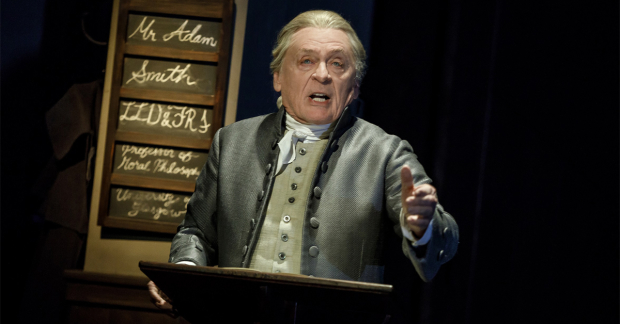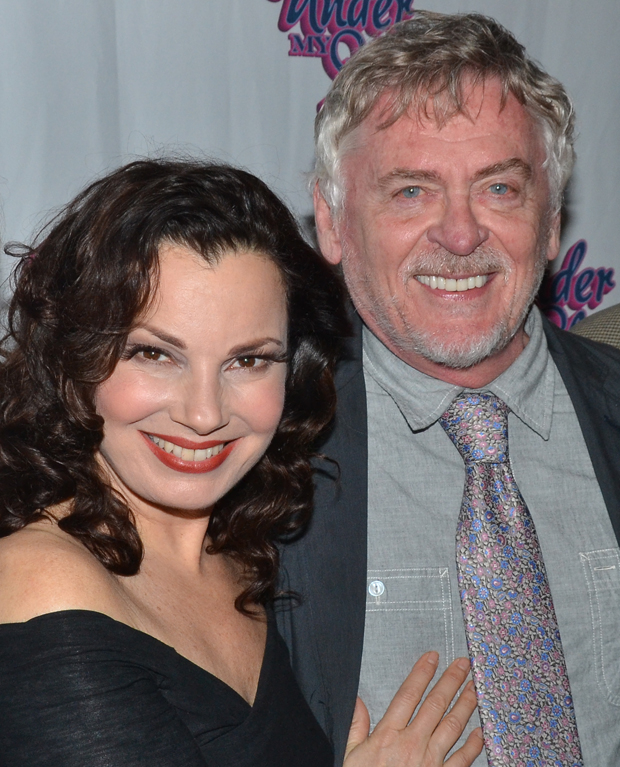The Nanny's Daniel Davis Takes the High Road in The Low Road
"I love plays that are about language and ideas, that I really have an emotional connection to," says Daniel Davis, a nominee for the 2000 Best Featured Actor Tony Award for his performance in Wrong Mountain. He is most familiar to audiences as Niles, the dry, witty British butler on The Nanny, but looking at the stage résumé of this distinctly American actor, an Arkansas native, one will see a wide range of roles and productions that exemplify his love (and his frequency in playing well-known figures): Sondheim's The Frogs, in which he played George Bernard Shaw; Stoppard's The Invention of Love, in which he costarred as Oscar Wilde; and Amadeus, where he played Antonio Salieri.
Davis is currently adding another character to his extensive list of accomplishments, the economist and philosopher Adam Smith, America's first laissez-faire capitalist. Smith serves as the narrator of Bruce Norris's rollicking new play The Low Road, directed by Michael Greif at the Public Theater. Davis jumped at the opportunity to take part in this production, though he encountered more challenges in the process than he expected.

(© Joan Marcus)
You and Bruce Norris go back to the days when he was still primarily an actor, right?
We did a play together in 1999-2000 called Wrong Mountain, that started in San Francisco and came to New York, not successfully, unfortunately. I didn't know at the time that he had aspirations as a playwright, so when he started emerging and won a Pulitzer, I was excited for him. I had gone to see his play A Parallelogram at Second Stage last summer, and Michael Greif and Bruce were both there, and we waved across the room. I was very impressed with his writing and sent him an email about the play. Maybe a week and a half later, I got a call from my agent that I had been offered this part and didn't have to jump through any hoops to get it.
The Low Road is a tricky play to discuss. How do you describe it to friends and family?
When I first read it, it felt like an old-fashioned Henry Fielding novel like Tom Jones. It has this very epic story to tell in a very picaresque series of adventures, only the adventures here aren't amorous; they're financial. You want the audience to know that although it is about complicated subjects, it's done in a humorous way and that they will glean knowledge, especially about finance and economics. Most of us see things happening and we don't really understand them because we're not economically minded. I think the audience will come away thinking that maybe it's not as complicated as they think it is.
You're playing the economist and philosopher Adam Smith. What have you learned about him through this process?
It's interesting to find that in some ways, he has been misinterpreted and misunderstood by the modern world. The focus that has been on him and his work [casts] him as a sort of champion of selfishness. The first book I read was his Theory of Moral Sentiments, in which his concern is for the greater good and people who are disenfranchised, especially the poor.
People who misinterpret him stop at a point and say, "Your enlightened self-interest is all you need to be concerned about," but Smith went on to say, "Once you have it, pass it on. Make sure that everybody is doing well." I think that a lot of modern interpreters have misunderstood that aspect of him.
How does this impact your performance?
I play Adam Smith as the narrator and creator of the story, but I do not interact with anybody in the play. I'm invisible to them, but they are visible to me. What I have been working on is that Adam Smith hears himself through the characters and realizes, "Oh my god, I have been completely misunderstood, and I do apologize for anything I might have done to the world." The theory of the Invisible Hand is only mentioned three times in over 12,000 pages of his work, and it's not really that important to him, but it has become very important in the 21st century. I play a little bit of his disappointment having created this understanding.
Is it hard to basically act alone?
It took a long time to get used to. It's kind of an isolating, lonely part, so I depend entirely on the audience's response. Rehearsals were difficult because I'm constantly surrounded by action, by music, by noise. In the production, I'm isolated in a spotlight and most of that is taking place around me in shadows and darkness, so I'm able to stay focused on the play more. But I love being part of a big company. That was basically my entire training, especially the six years I spent at A.C.T. We had a company of 54 actors all year, so I'm used to big shows and big productions and I really love them.
On another note, with all the TV reboots in the air, have you heard any talk of a Nanny reboot?
I have not heard that talk at all. I don't know about a reboot. It could be all of us in a home somewhere. C.C. and I running around with 20-year-old kids who are millennials.
Someone told me the other night that they heard there's going to be a musical of The Nanny, and I thought "Fran can't carry a note and I'm too old to be Niles now," so it would have to be a whole new cast of people. I can't envision that myself, but I don't want to kibosh it. Without Fran, there's no Nanny.
Who would you choose to play Niles in a musicalized Nanny?
Oh gosh. Who could? You'd have to get someone who could go a good faux-British accent and has a nice lyric baritone.

(© David Gordon)










